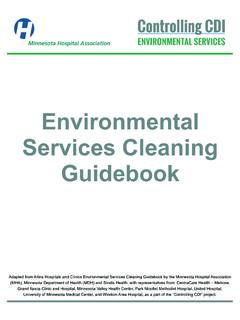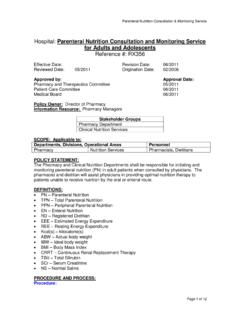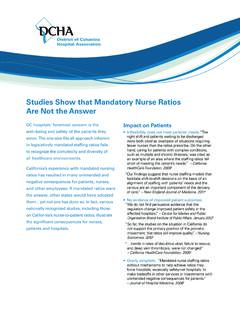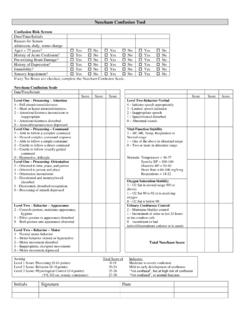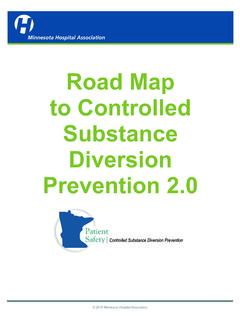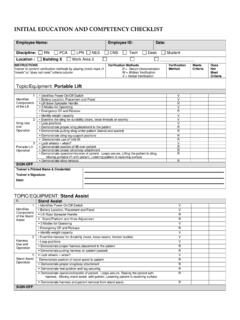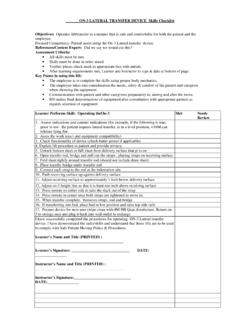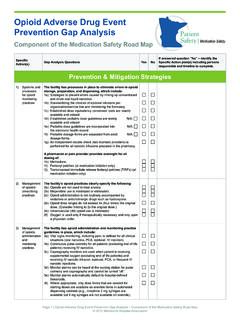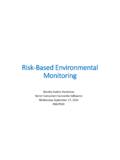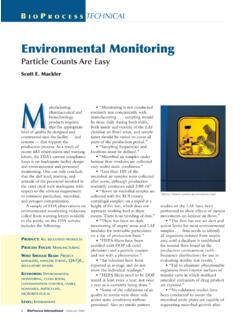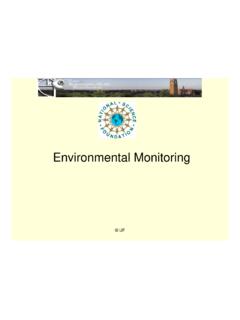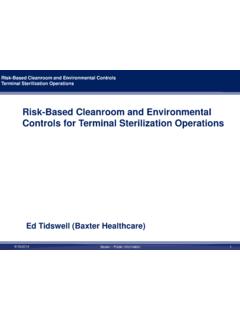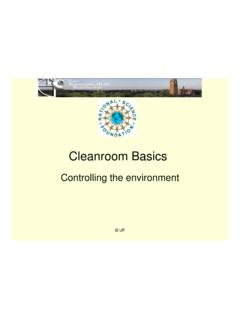Transcription of Cleaning Protocol for Environmental - MHA
1 Place picture here 2014 - 2016 Cleaning Protocol for Environmental Services Adapted from Allina Hospitals and Clinics Environmental Services Cleaning Education for the Controlling CDI LEAPT project, by representatives of: United Hospital, part of Allina Health University of Minnesota Medical Center, Fairview Park Nicollet Methodist Hospital Windom Area Hospital Minnesota Valley Health Center CentraCare Health - Melrose Grand Itasca Clinic and Hospital Minnesota Hospital Association Stratis Health Minnesota Department of Health Overview Environmental Services staff contribute to a positive experience for our patients and their families Environmental Services contribute to reduce hospital acquired infections Objectives Recognize Environmental Services contribution to the control of hospital acquired infections like Identify the role of infection control in Environmental service work Demonstrate the standardized process for Cleaning an occupied and a discharged room Recognize how to contribute to a positive customer service experience and
2 Patient satisfaction Incorporate AIDET into your daily interactions Background Hospital Consumer Assessment of Healthcare Providers and Systems (HCAHPS) Standardized patient satisfaction survey impacting reimbursement oDuring your hospital stay how often were your room and bathroom kept clean ? oYour hospital may add other questions. Background Value of a Standardized Cleaning Protocol Studies have indicated that: Contamination of surfaces and equipment in the patient room contribute to transmission of hospital acquired pathogens The process of Cleaning and disinfection can vary from person to person, or even between rooms with the same person. Background Value of Standardized Cleaning Protocol Studies have indicated that: Taking the "randomness" out by standardizing our Cleaning processes will help assure that surfaces are consistently cleaned well and exposed to adequate amounts of disinfectants.
3 Reducing the number of organisms in the patients environment reduces the opportunity for transmission of hospital acquired pathogens and infections, thus increasing patient safety. Minnesota Wide Education Plan Presentation Post Tests Demonstration Ongoing Education Plan New Employee Initial Orientation and Certification Yearly Training and Recertification Post Education Measurement Return Demonstration Evidence Based Monitoring- UV Testing Patient Satisfaction scores Infection Rates for hospital acquired C Diff Quality Control Guidelines Ultraviolet (UV) Gel Testing Direct Observation Quality Standards Basic Infection Control Concepts in Cleaning Hospital acquired infections Increase hospital costs $$$ Increase length of stay Decrease patient satisfaction Can change their life Often preventable Clostridium difficile Infection Clostridium difficile infection (CDI)
4 Is becoming more prevalent as a health care associated infection, causing diarrhea that can lead to colitis, colon perforation, sepsis, and, according to the Center for Disease Control and Prevention (CD), is fatal in approximately 14,000 Americans annually. CDC guidelines have been in place nationally for at least five years, targeting antimicrobial stewardship, early identification and treatment, and the prevention of health care facility transmission. Hospital acquired CDI Insert a graph of your hospital CDI rates over time if available Why is Environmental Cleaning important? Unit A Fewer spores =lower risk of acquiring CDI Unit B More spores =higher risk of acquiring CDI One Patient s Story Cost of CDI: Lost his colon 9 readmissions 143 days in the hospital OVER MILL in healthcare costs CDI Prevention Early isolation when a patient has symptoms Excellent hand hygiene (soap and water) Enteric Precautions Gown and Glove on room entry (past the door swing)
5 BLEACH or other sporicidal disinfection of surfaces and equipment High Touch Surfaces X represents culture positive sites ~ Contaminated surfaces increase cross-transmission ~ Disinfection Detergent Contains surfactants that clean and remove soil from surface Disinfectants Hospital approved chemicals that kill bacteria and fungus Disinfection Adequate amount Enough chemical to keep surface wet for required contact time Adequate contact time Amount of kill time required Determined by testing by the EPA Friction Wiping the surface removes bugs Saturation Having enough disinfectant on a cloth to ensure that enough chemical gets to the surface for the right amount of time. room Cleaning Summary Daily and terminal Cleaning important in removing germs from the patient s environment Use the right tools Use the right chemical Use the right amount of chemical for the right amount of time Infection Control and Cleaning Video From Top to Bottom: The Front Line Of Infection Control Personal Protective Equipment (PPE) Eye protection Gloves Isolation Gown Mask N95 Respirator Papr Donning and Doffing Practice Multi Drug Resistant Organisms MDROs Multi Drug Resistant Organisms MDROs Gowning and gloving are required any time you enter the room of a patient in contact precautions whether or not you touch, or plan to touch, the patient or anything in the patient s room .
6 Patients should be educated on why contact precautions are being used and the role of good hand and respiratory hygiene (cover your cough) in preventing infections. Only Infection Prevention and Control is allowed to discontinue Contact Precautions for MDRO. If you have questions about what you need to do when you have a patient with MDRO, talk to your supervisor. Isolation Cleaning Procedures Airborne Precautions Contact Precautions Droplet Precautions Enteric Precautions Strict Contact Precautions Neutropenic Please complete The Front Line of Infection Control Post Test Break Time Core Cleaning Concepts Video From Top to Bottom: Cleaning The Occupied/Discharged Patient room High Touch Areas (Patient room ) Focus on High Touch Areas High Touch Areas High-touch surfaces are those that have frequent contact with hands.
7 High-touch surfaces in care areas require more frequent Cleaning and disinfection than minimal contact surfaces. Cleaning and disinfection is usually done at least daily and more frequently if the risk of Environmental contamination is higher ( , intensive care units). #1- Bed Rails #2 - Bedside Table #4 - Nurse Call Box #3 - Patient Phone #5 - Overbed or Tray Table #6 - Patient Chair #8 Computer Keyboards #7 - Door Handles Inside and outside of room #9 Light Switches # 10 In room sinks High Touch Areas (Patient Restroom) #11- Toilet Seat #12 - Toilet Handle #14 - Bathroom Sink #13 - Toilet Hand Rails #15 Bathroom Light Switch #16 Bathroom Door Handle room Zoning Hot Zone Cleaning The equipment and areas closest to the patient are the most contaminated and considered the "Hot Zone".
8 As you move further from the patient, surfaces are less contaminated. Starting with the bed will allow adequate contact time with the disinfectant. Once the Hot Zone has been cleaned and disinfected, take a fresh Cleaning rag and work clockwise from cleaner to dirtier (green to yellow ring on the diagram). room Zoning Concentric circles around patient signify levels of potential Environmental contaminationPatients & direc t contact itemsItems touched du ring patient careShared equipment & common surfacesHOT ZONEHOT ZONERoom Cleaning Path Occupied room Cleaning Process Checklist See page 10 of Environmental Services Cleaning Guidebook Terminal room Cleaning Process Checklist See page 12 of Environmental Services Cleaning Guidebook Special Cleaning Procedures Bedbugs Lice/Scabies Chicken Pox/Shingles Large Blood Spills Privacy Curtains Please complete the Cleaning Occupied and Discharged Patient Rooms Post Test Break Time AIDET Five Steps to Achieving Satisfaction Basic AIDET Concept Core Customer Services Examples AIDET Customer
9 Service In Action A = Acknowledge I = Introduction D = Duration E = Explanation/Interaction T = Thank You AIDET is a registered trademark of Studer Group A = Acknowledge Acknowledge the patient by knocking on door and announcing yourself. Ask for the patient s permission to enter the room (Knock) Housekeeping may I enter your room ? I = Introduction Introduce yourself with your Name, Department, and make sure this is an ok time to clean for the patient My name is Nick from Housekeeping and I am here to clean your room today. Is this a good time for you? D = Duration Explain to the patient how long the Cleaning process will take It will take me between 10 and 15 minutes to clean your room today. E = Explanation / Interaction Explain to the patient what you are doing in the room today.
10 Make sure to interact with the patient during your Cleaning process. While I am in your room today I will be Cleaning some key areas in your room such as the trash, floors, restroom, and you can expect to see me once a day. I want to make sure I am meeting your needs so please tell me if you have any specific cleanliness needs at any time. E = Explanation / Interaction During this time you want to make the patient the center of your work by always asking the following questions: Is everything working correctly in your room today? T = Thank You Thank the patient for their time and choosing your hospital Make sure to remind the patient about the wet floors and drying time Always make sure to ask if you can do anything else for the patient. Always thank the patient for their patience and for coming to your facility for their care.
